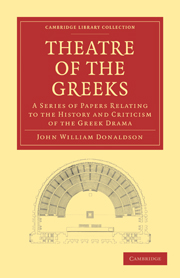Book contents
- Frontmatter
- PREFACE
- ERRATA
- Contents
- PART I THE HISTORY AND EXHIBITION OF THE GREEK DRAMA
- CHAPTER I On the origin of Dramatic Exhibitions in general
- CHAPTER II On the Origin of the Greek Drama
- CHAPTER III Union of the two Elements. Thespi
- CHAPTER IV On the proper Classification of Greek Plays. Origin of Comedy
- CHAPTER V On the Greek Tragedians
- CHAPTER VI On the Greek Comedians
- CHAPTER VII On the Representation of Greek Plays
- PART II ARISTOTLE
- PART III EXCERPTA CRITICA
- INDEX
CHAPTER IV - On the proper Classification of Greek Plays. Origin of Comedy
Published online by Cambridge University Press: 06 December 2010
- Frontmatter
- PREFACE
- ERRATA
- Contents
- PART I THE HISTORY AND EXHIBITION OF THE GREEK DRAMA
- CHAPTER I On the origin of Dramatic Exhibitions in general
- CHAPTER II On the Origin of the Greek Drama
- CHAPTER III Union of the two Elements. Thespi
- CHAPTER IV On the proper Classification of Greek Plays. Origin of Comedy
- CHAPTER V On the Greek Tragedians
- CHAPTER VI On the Greek Comedians
- CHAPTER VII On the Representation of Greek Plays
- PART II ARISTOTLE
- PART III EXCERPTA CRITICA
- INDEX
Summary
The best actors in the world, either for tragedy, comedy, history, pastoral, pastoral-comical, historical-pastoral, tragical-historical, tragical-comical-historical-pastoral, scene individable, or poem unlimited. For the law of writ and the law of liberty these are the only men.
Shakspeare.It is generally stated that there were three kinds of Greek Plays, and three only—Tragedy, Comedy, and the Satyrical Drama. It will be our endeavour in the following pages to examine this classification, and to see whether some better one cannot be proposed. With a view to this it will be proper to inquire into the origin of the Comical and Satyrical Dramas, just as we have already investigated the origin of Tragedy, and to consider how far the Satyrical Drama differed from or agreed with either the Tragedy or Comedy of the Greeks.
The word Tragedy—τργῳδία—is derived of course from the words τράγος and ᾠδή. The former word is a synonym for σάτνρος; the goat-eared attendant of Dionysus is called by the name of the animal which he resembled, just as the shepherd or goatherd was called by the name of the animal which he tended, and whose skin formed his clothing. Τραγῳδία is therefore not the song of a goat, because a goat was the prize of it; but a song accompanied by a dance performed by persons in the guise of Satyrs, consequently a satyric dance; and we have already shewn how Tragedy in its more modern sense arose from such performances.
- Type
- Chapter
- Information
- Theatre of the GreeksA Series of Papers Relating to the History and Criticism of the Greek Drama, pp. 48 - 57Publisher: Cambridge University PressPrint publication year: 2010



